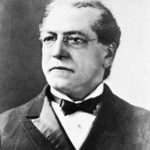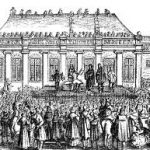The word itself – ‘Communist’ – was certainly first heard as long ago as the 1840s. Both Karl Marx (q.v.) and his promoter Engels used the word, but it was not until after the Russian Revolution (q.v.) of 1917 that fervid Marxists detached themselves from the more moderate Social Democrat Parties, to form groups (and committees) called Communist Parties. In Russia, Bolsheviks did not officially adopt the term until 1918. When the news of the shooting of the royal family spread, it was considered wise to tone down the ‘Ekaterinburg/Bolshevik’ connection, replacing ‘bolshevik’ by a little-known word. There had been ‘Communes’ in Europe, especially in France, but ‘Communists’ was something new.
In 1924 the ‘All-Union Communist Party – (Bolshevik)’ declared itself open for business, and retained this name until 1952, when at last the word ‘bolshevik’ was dropped in favour of the ‘Communist Party of the Soviet Union’.
Except for a brief period from the end of 1919 to the spring of 1921, the Communist Party had been the only political organisation in Soviet-held lands. Internal conflicts, factions, minor ‘palace’ revolutions, bickering and general dissent may have been produced within the Party since then, but resolute purges have proved useful if costly in terms of lives. There was the Trotsky/ Stalin argument for instance after the death of Lenin, but that was solved with an ice pick in a foreign land. Then there was the elimination of Stalin’s enemies in the late 1930s, dealt with effectively by the purge known as the ‘Yezhovshchina’.
Party congresses in 1956 and 1961 became scenes of further dispute between the leaders, such as Nikita Kruschev, who favoured a ‘softening’ of traditional communist attitudes, whereas the hard-liners Molotov, Malenkov and others were not. This was put down by historians to the latters’ being essentially ‘Stalinist’. Kruschev was a wily old bird who fully understood the real state of Soviet military power, and therefore preferred diplomatic language to sabre rattling, though he was not averse on one occasion to using a shoe to emphasise his point of view.
With the coming of Soviet military successes at the end of the Second World War, a long period of intensive ‘educational’ activity began in other countries. Communism was encouraged, if not actively financed in France, Italy and some South American states. The German Communist Party had been founded in 1918, but did not flourish partly because fellow Germans murdered its leaders within two weeks of its inception. Communists in Germany carried on the good work until stopped by Hitler, although internal divisions hindered progress.
In Hungary a Communist Party had also been founded in 1918, and even enjoyed a brief period of office under Bela Kun before going underground, emerging to the surface after the Russian occupation of Hungary in 1945. The Bulgarian Communist Party (1919) stage managed a moderately successful rising in 1923, but had to wait until the arrival of the Soviets, again in 1945. The Jugoslav Communist Party (April 1919) gained a great deal of success in municipal elections in 1920, but had to submerge like their Hungarian colleagues in 1921 after one of their number killed the Minister of the Interior. Communism continued to influence the Jugoslavs, especially in the better educated sectors, though there was much opposition to the occupying powers during the Second War. In this way the Party gained a high degree of independence from Moscow in the post-War period under Marshal Tito.
In Czechoslovakia there was an influential Communist Party between the Wars, revived in 1945 and securing control of the Republic in 1948. In Spain the Party was established in 1920 but was sparse in affiliated members. President of the 2nd Republic Azaña was noticeably pro-Soviet. During the Civil War (q.v.) the smallish Communist faction was able to influence the non-communist left-wing because of the military support from Soviet Russia it could summon. Communists in Spain are numerous now, and one of their leaders, Santiago Carillo, was invited to return from exile by King Juan-Carlos after the death of Franco.
Various Asian countries embraced Communist ideology after 1945, the most important being China, which became the most important branch of the family outside Russia. The Chinese Communist Party was established by two professors at Beijing University (then called Pekin) Chen-Tu-hsiu and Li Ta-chao in July, 1921. It became an easy job to spread the new doctrines across even such a vast country as China, because of so many divisions in non-communist sectors. There was also considerable support from the Soviets.
Conflict between the Chinese Communist Party and a right-wing group in the Kuomintang (Chinese Nationalist Party) led by Chiang Kai-shek exploded in 1926, and within the year the original Party had almost been eliminated. But a new party was developed by the survivors under Mao Tse-tung, a guerilla leader from the Kiangse region who had actually attended the founding Congress in 1921 at age 28. It was Mao who organised the defence of China against the Japanese from 1937 to 1945. Once the War was over, more fighting broke out between the Kuomintang and the Communists, which was ended by Mao using the usual methods, and a fully Communist Government was established in Beijing in 1948.
China became unique at the end of the twentieth century by maintaining its Communist principles, though embracing a moderate from of Capitalism. Russia is also capitalist again, but has, nominally at least, not renovated its Marxist exclusion of any other ideals.
An experiment in Communism was tried in Chile by Salvador Allende, but having bankrupted the state and made himself unpopular with both the right-wing and the United States, his Communist Party was erradicated and Allende himself was killed. In Central America various small states like Nicaragua have danced with Communism, but not established anything permanent. In Cuba an intolerable and disagreeable right-wing government under Batista was removed by a ‘people’s Revolution’ that after victory established a worse regime than before, reducing one of the world’s greatest and most beautiful islands to penury and suppression under Fidel and Raoul Castro, who continue to dominate. Cuba was financed almost one hundred percent by Soviet Russia until the fall of Communism there.
In Britain there is an official Communist Party not without merit, but it is not taken seriously.










Leave A Comment